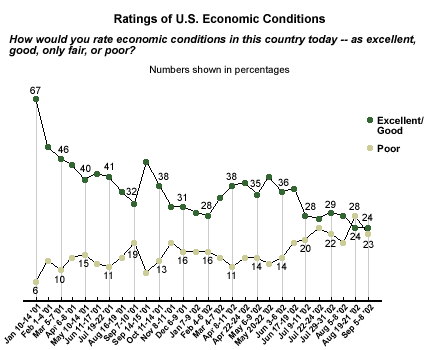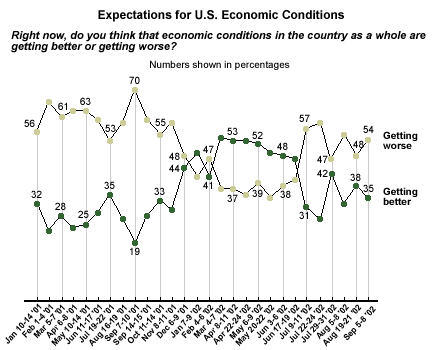One year ago -- just prior to the Sept. 11 attacks -- economists were debating whether the economy was in a recession. Following the terrorist attacks, all doubts were removed and there was general agreement that an economic recession had taken hold during the third quarter of the year. Later, we learned that the recession of 2001 had actually begun in March.
More Consumers Rate the Current Economy as Poor
Is the economy better off now than it was a year ago? According to a new Gallup Poll completed over the weekend (Sept. 5-8)*, the American public's assessment of current economic conditions is now worse than it was just prior to Sept. 11, 2001. Currently, 23% of the public rates the economy as poor while only 24% rate it as good or excellent. A year ago (Sept. 7-10), only 19% rated the economy poor compared to 32% who rated it good or excellent. In fact, the percentage of consumers rating today's economic conditions as good or excellent is at its lowest level since April 1994.

Are We Back in Recession?
Does this mean that we are now experiencing a double-dip recession and are just unaware of it? A lot of retailers might say yes, given the surprisingly weak back-to-school sales they are reporting. Many in the manufacturing sector might agree, given the renewed weakness in that sector during August. Many on Wall Street might also grudgingly accept the double-dip theory, given the way the equity markets began September. Still, like many economists, I don't think this is the case.
A Far Different Consumer Psychology
Following Sept. 11, the auto and housing industries learned something extremely important -- that consumer psychology is far different now than in past recessions. Most consumers don't seem to fear becoming unemployed, nor do they fear being unable to pay their bills. Instead, many consumers are willing and able to take a longer view, and will make large discretionary purchases right now if auto dealers offer incentives such as no- or low-interest financing or if housing lenders offer new low rates and low monthly payments.
There are many good reasons why the consumer is acting differently in this economic slowdown than during past recessions:
- Many U.S. consumers view the current economic weakness as temporary. Nearly twice as many consumers (35%) say the economy is getting better now than were saying that a year ago (19%).
- Even more importantly, many consumers believe they will be unaffected by the weak economy, as 47% say their personal financial situations are getting better as opposed to 37% saying they are getting worse. Two out of three also say that the financial conditions of the companies they work for are getting better, not worse.
- Most importantly, we have had a decade of good economic times. Many of today's consumers have never experienced hard economic times. And many others have forgotten what they can be like.

Key Points
In the short term, this new consumer psychology may help us avoid the dreaded double-dip recession that so many argue won't happen. If we can continue to build and sell cars and homes, the economy may experience a "growth recession," but not a traditional downturn.
Still, if policy-makers don't get the economy growing significantly very soon, my guess is that consumers will return to the old recession psychology of the past. They will not only stop spending at the retail counter, but they will also stop buying cars and homes, even when the monthly payments seem very attractive. They may even become pessimistic about the longer-term prospects for the economy. This "Japanese-like" consumer psychology -- one in which consumers lose confidence in the ability of the economy to recover over the longer term -- is not something we want to experience in the United States.
*Results are based on telephone interviews with 1,004 national adults, aged 18 and older, conducted Sept. 5-8, 2002. For results based on the total sample of national adults, one can say with 95% confidence that the maximum margin of sampling error is ±3%. In addition to sampling error, question wording and practical difficulties in conducting surveys can introduce error or bias into the findings of public opinion polls.

